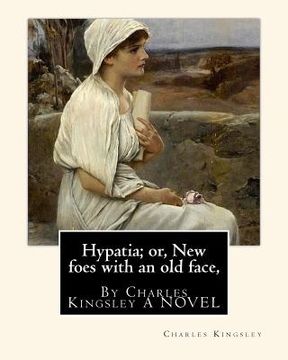Reseña del libro "Hypatia; or, New foes with an old face, By Charles Kingsley A NOVEL (en Inglés)"
Hypatia, or New Foes with an Old Face is an 1853 novel by the English writer Charles Kingsley. It is a fictionalised account of the life of the philosopher Hypatia, and tells the story of a young monk called Philammon who travels to Alexandria, where he becomes mixed up in the political and religious battles of the day. Although intended as Christian apologia, the novel has a deliberate anti-Catholic tone, and it also reflects Kingsley's other prejudices about race and religion, many of which were typical to the 19th century.For many years the book was considered one of Kingsley's best novels and was widely read.Plot--The plot revolves around Hypatia the pagan philosopher;Cyril the Christian patriarch;Orestes the power-hungry prefect of Egypt; and Philammon an Egyptian monk.Philammon travels from his monastic community in the desert to Alexandria, and expresses a desire to attend Hypatia's lectures despite Cyril's dislike of Hypatia.Although Hypatia has a deep-seated hatred of Christianity, Philammon becomes her devoted friend and disciple.Philammon also encounters Pelagia, his long-lost sister, a former singer and dancer who is now married to a Gothic warrior.Philammon naturally desires to convert both women to Christianity.The plot is played out against the backdrop of Orestes' scheming to become emperor of Egypt and Africa; he uses Hypatia as a pawn.A subplot involves Raphael Aben-Ezra, a wealthy Jewish associate of Hypatia who falls in love with a Christian girl called Victoria and converts to win her love.A series of events, some of which are orchestrated by a Jewish woman called Miriam, raise tensions between the prefect and the church.Hypatia undergoes a spiritual crisis and comes close to being converted to Christianity by Raphael. Before this can happen, however, rumours are spread that Hypatia is the cause of unrest in the city and she is murdered by a Christian mob. Philammon, despondent, returns to the desert where he eventually becomes abbot of his monastery, albeit with a more worldly view of Christianity.Themes---Hypatia has a strong anti-Catholic tone which reflects Kingsley's own dislike of priests and monks.Kingsley's portrayal of a fractious and corrupt early Church represented by Cyril and the clergy is intended to reflect the 19th-century Catholic church. Kingsley also disliked priestly celibacy, and makes it clear that, in his view, it damages those who practise it. He was, nevertheless, keen to assert the moral superiority of Christianity over Judaism: of the two Jewish characters in the novel, one - Miriam - is consistently malevolent, and the other - Raphael - abandons his home to become a disillusioned wandering Jew before converting to Christianity. The portrayal of Greco-Roman paganism in the novel is likewise negative: thus when Orestes attempts a pagan revival in Alexandria, he does so by restoring the spectacle and butchery of the gladiatorial arena. Kingsley also devotes parts of the novel to expounding Neoplatonism and explaining its apparent flaws.Kingsley expresses a view of the superiority of northern Europeans in his portrayal of the Goths in Alexandria as saviours of Christianity, who, although crude and violent, possess the necessary Teutonic values of hardiness and virility to counter the corrupt church.This reflects a theme which Kingsley would later expound in a book and lecture series entitled The Roman and the Teuton.A further theme is the way Kingsley links religious insight with eroticism, a theme which is most overtly displayed in the climax of the novel with Hypatia stripped naked, being torn apart by monks under an enormous image of Christ..Charles Kingsley (12 June 1819 - 23 January 1875) was a broad church priest of the Church of England, a university professor, social reformer, historian and novelist. He is particularly associated with Christian socialism, the working men's college, and forming labour cooperatives that failed but led to the working reforms of the prog

